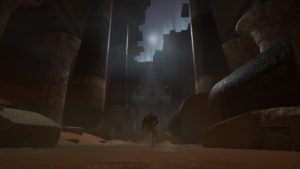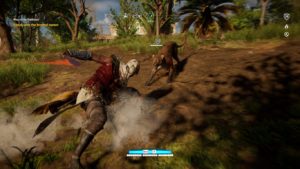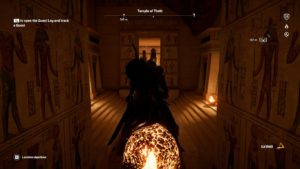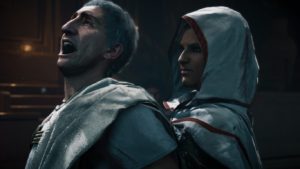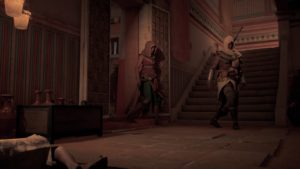Those who have read (this is getting a bit cliched now isn’t it ?) my review of AC Syndicate will know I’m a big fan of the series. In fact, this is the only series which I’ve almost finished, and barring AC III, never regretted it. This is also the franchise that took an unusual two-year break after Syndicate. So expectations were high, and well, they’ve been fulfilled. The game is everything AC should be – big, beautiful, historical with lively characters and of course, with excellent parkour and gameplay. The problem though, is that it is these very features that make it a rather unusual and I’d say, distracting, experience.
Graphics – The graphics are breathtaking, as usual. I say as usual because after witnessing London in all her glory, and jumping through glitched Paris, I thought I’d seen it all. After all, there would be fewer great buildings to create, and lesser crowds. But Egypt is truly beautiful. The buildings are true to history, which is a huge achievement because unlike Paris and London, most of them have been reduced to ruins long back. Again, the tombs and temples are shown to be derelict, but not as derelict as today, giving an impression of the huge timespan that Egypt had already seen before we come to the Ptolemaic period, where the game is set.
Beyond the breathtaking temples, spooky tombs and other creations of mankind, there is of course, nature itself. Expectedly, population is thick around the Nile and thins out rapidly as we move away. Move a little more than a kilometer from the Nile and you get the desert. The desert is  accurate, even to the point of the protagonist Bayek’s shoes sinking in and pulling out of the sand! What would have made things more realistic is if they had included dehydration mechanics. But given how well malaria went in Far Cry 2, I would keep that sort of realism at bay.
accurate, even to the point of the protagonist Bayek’s shoes sinking in and pulling out of the sand! What would have made things more realistic is if they had included dehydration mechanics. But given how well malaria went in Far Cry 2, I would keep that sort of realism at bay.
Move closer to the Nile though, and you find palm trees and farms recreated in excellent detail. They are of course more primitive, but beautifully rendered. Whether you are running across sandy 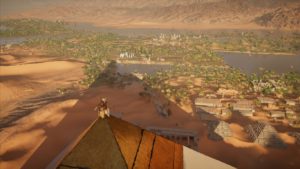 patches among palm trees, hunting leopards or deer or hiding in the tall bushes, the game never lets you feel as if you’re out of place or time. Indeed, for those who have come from Shadow of War or Far Cry series, the landscape is remarkably similar but unique because it is historical.
patches among palm trees, hunting leopards or deer or hiding in the tall bushes, the game never lets you feel as if you’re out of place or time. Indeed, for those who have come from Shadow of War or Far Cry series, the landscape is remarkably similar but unique because it is historical.
Speaking of historical, the game tries to recreate historical figures from antiquity. Here, it falls a little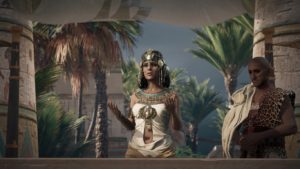 short. Like Watch Dogs before it, the faces and gestures are just that little bit wooden. The flowing robes are a little bit triangulated and stiff, and you the eyes are just a little bit lifeless. This need not have happened because we know how realistic facial animations are, even in Far Cry 4. Maybe Ubi’s budget didn’t allow it, or maybe the
short. Like Watch Dogs before it, the faces and gestures are just that little bit wooden. The flowing robes are a little bit triangulated and stiff, and you the eyes are just a little bit lifeless. This need not have happened because we know how realistic facial animations are, even in Far Cry 4. Maybe Ubi’s budget didn’t allow it, or maybe the 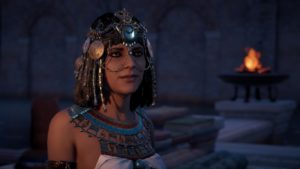 huge number of characters’ facial animations would have broken the engine. We don’t know, but Ubi simply doesn’t get full marks here.
huge number of characters’ facial animations would have broken the engine. We don’t know, but Ubi simply doesn’t get full marks here.
Rating – 5/5
Plot – Veterans like me have come to expect revenge plots from practically every AC game. Syndicate was an exception, and a very refreshing one at that. AC Origins goes back to the tried and tested formula. Except this time, there is no Brotherhood to begin with. The game instead puts you into the shoes of a hereditary protector, Bayek, who hails from the desert oasis region of Siwa. He is an ethnic Egyptian, and something of a small town guy, with deep religious beliefs and the fervent hope that he’d settle down with his wife Aya when all is over.
What is this “all” ? Basically, a mysterious order called the Order of the Ancients had found the Apple of Eden and wanted Bayek’s “help” in figuring things out. When he told them he didn’t know, they threatened to kill his son Khemu. Khemu tries to free his father, but the ensuing combat leads Bayek to accidentally kill Hemu. And of course, he blames the Order. Long story short, the Order must die.
Then follows the usual “search-and-destroy” storyline, where Bayek moves from one region to another, taking down members of the Order, only to find there are more. Within this storyline, 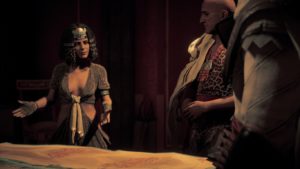 Cleopatra and her intrigues are thrown in, with Caesar coming in eventually. Like the young Ezio and somewhat like Elise, Bayek is driven by a mad rage that leads him to attack with deep hatred. Not that he isn’t careful, since the final assassination missions are very well crafted (except the Taharqa one, which basically ended in five minutes) and can be approached from
Cleopatra and her intrigues are thrown in, with Caesar coming in eventually. Like the young Ezio and somewhat like Elise, Bayek is driven by a mad rage that leads him to attack with deep hatred. Not that he isn’t careful, since the final assassination missions are very well crafted (except the Taharqa one, which basically ended in five minutes) and can be approached from  multiple angles. But this isn’t the suave Evie or the measured older Ezio, and you get the feeling that they’ll slip up eventually.
multiple angles. But this isn’t the suave Evie or the measured older Ezio, and you get the feeling that they’ll slip up eventually.
Except they never do. The game has no vicious twists, no heartrending endings and no strange loose ends. The one twist there is turns out to be almost benevolent, because we are practically unaffected and are soon on the trail again. Good guys remain good, and barring Cleopatra (whom we  knew was a mistress of intrigue) few turn out to be anything but what they appear at face value. The one exception – Taharqa – is a genuine blindsider, but he’s one in a game that has at least a dozen targets.
knew was a mistress of intrigue) few turn out to be anything but what they appear at face value. The one exception – Taharqa – is a genuine blindsider, but he’s one in a game that has at least a dozen targets.
Another gripe I have about the whole thing is that the game, very annoyingly, switches between Aya and Bayek for plot purposes. The trouble is, unlike Evie and her brother, you can’t customize them as and how you like. You can only work with Bayek, while Aya gets fixed levels and gear. Imagine my  frustration when I’ve honed a certain approach using hunter and predator bows (basically the equivalents of powerful crossbows and sniper rifles) only to be handed light and warrior bows (which have different mechanics) for Aya. Also, you can’t free roam with Aya, even though there are substantially large sections of the game where
frustration when I’ve honed a certain approach using hunter and predator bows (basically the equivalents of powerful crossbows and sniper rifles) only to be handed light and warrior bows (which have different mechanics) for Aya. Also, you can’t free roam with Aya, even though there are substantially large sections of the game where  you have to play her. In the end, this makes for sections which are must-complete but extremely irritating.
you have to play her. In the end, this makes for sections which are must-complete but extremely irritating.
More irritating is the fact that unlike previous games, you aren’t the main decision-maker. Most of the time you are playing second-fiddle to your wife or Cleopatra or Appolodorus or someone else. Without sounding sexist, I’ll posit that the main protagonist should have more agency. Aya decides who to kill, where to go, and leaves you  without giving you the choice to follow or take her along on some missions. In the end, she simply breaks up so you and she become “Hidden Ones”, but aren’t in a relationship anymore. More jarringly, she doesn’t seem to be that much perturbed by her son’s loss at this point, making you wonder whether you were the one seeking a happy family while she was after more worldly goals.
without giving you the choice to follow or take her along on some missions. In the end, she simply breaks up so you and she become “Hidden Ones”, but aren’t in a relationship anymore. More jarringly, she doesn’t seem to be that much perturbed by her son’s loss at this point, making you wonder whether you were the one seeking a happy family while she was after more worldly goals.
The irritating Aya aside, the game takes its plot and history seriously. Cleopatra, Caesar and the others are portrayed vividly and their characters have a life which would have taken a good amount 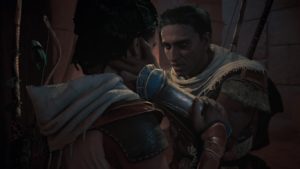 of effort to bring about. I know I have griped about the graphics of these characters, but the dialogue is spot on, and makes you feel as if you’ve been transported to the period.
of effort to bring about. I know I have griped about the graphics of these characters, but the dialogue is spot on, and makes you feel as if you’ve been transported to the period.
Beyond the main game, there are a number of side missions which open up interesting sub-plots. As with Watch Dogs 2, they don’t’ really connect with the main plotline, but tell more abo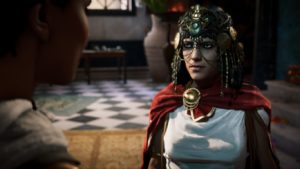 ut Bayek in particular. For me, these helped make the protagonist more human an likeable, something I could never do when it came to Aya.
ut Bayek in particular. For me, these helped make the protagonist more human an likeable, something I could never do when it came to Aya.
Overall, the story is a little jaded but has enough that’s refreshing in it for one to remain interested. For history buffs like me, the very thought of interacting with Cleopatra and Caesar would be enough, but even if you’re not into history like me, the whole story would be good enough to last a dozen hours at least.
Rating – 4/5
Gameplay – For someone who had to create an entire Reddit thread to bitch about the gameplay mechanics, having to say that the overall gameplay is great is a bit of a mea culpa. To begin with, the fighting is very different from what it was in the previous AC games, and requires you to be a lot more agile. The game doesn’t suggest this, asking you instead to use the shield as much as possible. As with all shields though, half the attacks cannot be blocked and you become immobile while using  it, exposing you to attacks from other sides. Instead, you must dodge, dodge and dodge. There are no counter prompts but if you can get an enemy off-balance, your next attack automatically becomes a counter.
it, exposing you to attacks from other sides. Instead, you must dodge, dodge and dodge. There are no counter prompts but if you can get an enemy off-balance, your next attack automatically becomes a counter.
These are important, because assassination no longer works the way it should. Like actual RPGs,  your hidden blade also has a damage rating. Attack enemies with a higher lifebar and you will deal substantial but not lethal damage. This is especially problematic when you’re in missions where a good number of the enemies are of a higher level. Take the example of Pissa Oros Citadel in the Isolated Desert. The defenders are typically levels 38-40, which are the highest levels
your hidden blade also has a damage rating. Attack enemies with a higher lifebar and you will deal substantial but not lethal damage. This is especially problematic when you’re in missions where a good number of the enemies are of a higher level. Take the example of Pissa Oros Citadel in the Isolated Desert. The defenders are typically levels 38-40, which are the highest levels  in the game. Indeed, moving into the region at any level below 35 is a death sentence. However, there is a mission which asks you to head there at level 35 itself, and your primary target is at 35. But the defenders are much higher. In an ordinary AC game, you’d sneak about, assassinating the enemies until only the bosses remained. Then you’d somehow either avoid them or take them out while completing your objectives.
in the game. Indeed, moving into the region at any level below 35 is a death sentence. However, there is a mission which asks you to head there at level 35 itself, and your primary target is at 35. But the defenders are much higher. In an ordinary AC game, you’d sneak about, assassinating the enemies until only the bosses remained. Then you’d somehow either avoid them or take them out while completing your objectives.
But now you can’t take them out. Stabbing a level 39 enemy takes a sliver off their health bar, leaving you to fight a tough battle or be killed. This makes taking on higher level citadels or enemies virtually impossible, and turns the game into much more of a leveled dungeon-crawler than it had to be.
The same is the situation with loot. You have to constantly get better gear to defeat more powerful enemies. Moving away from historicity, the game adds special attributes to the weapons and other gear, which you must use to your advantage. However, it also adds levels and “quality”. This means  that you can’t use a level 37 sword if you’re level 36. Hence, even if you managed to kill off that powerful enemy, you won’t be able to use the weapon until you level up.
that you can’t use a level 37 sword if you’re level 36. Hence, even if you managed to kill off that powerful enemy, you won’t be able to use the weapon until you level up.
This can sometimes make the game a grind. Most RPG type games turn the last 10 odd levels into a grind. Diablo II did that with the levels 20-30, The Division did that with the same bracket and AC Origins does that with levels 30 to 40. With the final 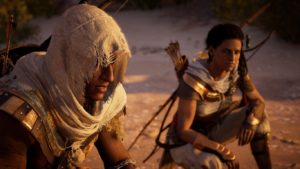 levels requiring in excess of 20000xp each, you have to complete at least 6-8 missions to move to the next level. While this doesn’t hurt those playing the main storyline only (because the final mission requires a level of 35 only), those seeking to become masters of Egypt have a lot of grief ahead of them.
levels requiring in excess of 20000xp each, you have to complete at least 6-8 missions to move to the next level. While this doesn’t hurt those playing the main storyline only (because the final mission requires a level of 35 only), those seeking to become masters of Egypt have a lot of grief ahead of them.
Not that the side missions are boring. You’d do everything from buying prostitutes to jumping off buildings to impress children in order to get that sweet sweet XP. There are also various weapon giveouts, and many of these can be lifesavers. For instance, a certain quest called Gift from the Gods gave me stuff that I used for the next 8 odd levels.
Now to talk of bosses. Unlike Syndicate, where you could simply drop off bosses with good assassination skills, here you must fight them as in a regular RPG. This isn’t true for all the Order leaders though. Some will fall pretty easily (like Berenike, whom I killed with a headshot). Others, like Khaliset, will be troublesome but not very tough. Indeed, barring the last boss – Septimius – there are hardly any bosses worthy of a hard half-an-hour fight. Mostly you must dodge and stab your way to victory, and of course, revenge.
hardly any bosses worthy of a hard half-an-hour fight. Mostly you must dodge and stab your way to victory, and of course, revenge.
The real tough battles lie elsewhere. One series of completely optional and rather tough fights involve the Phylakes. These are bounty-hunters, who appear at various times on the map (in specific regions) and will attack on sight. At lower levels, they are best avoided, since they are truly devastating. However, once you reach their level (or cross it), you are free to take them on and finish them off. These battles take around ten minutes at the least, and involve some deft keyplay, since their attacks are truly devastating. They should definitely be attacked though, since they drop legendary equipment and lead to a final ending which is quite rewarding.
 The other tough battle is called the Trials of the Gods. Here, a random Egyptian god will fight you. Barring the dream sequence mission, this is the only mission where you have a long and arduous boss fight ahead of you, akin to perhaps the Witcher. Dodge, block, dodge and continue for half an hour to eventually defeat the boss and claim the Anubis loot. Again, this is completely optional though, and puritans seeking to retain the original flavor of AC can skip it completely.
The other tough battle is called the Trials of the Gods. Here, a random Egyptian god will fight you. Barring the dream sequence mission, this is the only mission where you have a long and arduous boss fight ahead of you, akin to perhaps the Witcher. Dodge, block, dodge and continue for half an hour to eventually defeat the boss and claim the Anubis loot. Again, this is completely optional though, and puritans seeking to retain the original flavor of AC can skip it completely.
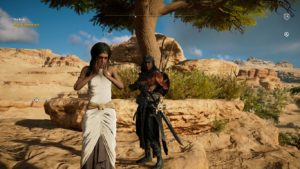 But they are not easy to skip, because after a time, they are what make you come back to the game again and again. I had talked about distracting, and this is the most distracting part. You are drawn off into side quests ever so often that the story becomes a second priority. Missions are unique for the most part, characters are interesting (especially the ahem….female ones), and you
But they are not easy to skip, because after a time, they are what make you come back to the game again and again. I had talked about distracting, and this is the most distracting part. You are drawn off into side quests ever so often that the story becomes a second priority. Missions are unique for the most part, characters are interesting (especially the ahem….female ones), and you 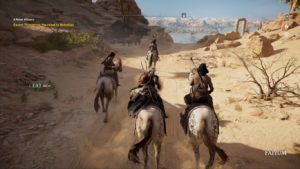 genuinely want to help these people out. Hence, even when you’re not grinding for XP, you will probably be playing a good number of side missions before going into the next main battle.
genuinely want to help these people out. Hence, even when you’re not grinding for XP, you will probably be playing a good number of side missions before going into the next main battle.
One last honourable mention must be made of the arena. Given the success of the arena in FC4, it was bound to make a comeback, given that Greece and Rome were famous for their arenas. You initially team up with a female champion (who seems to know Bayek but of whom we have no clue), but after that you can go back in as frequently as you like. You can defeat champions and get good weaponry and XP. I personally found the XP to be a little scarce, but the loot was definitely worth it.
know Bayek but of whom we have no clue), but after that you can go back in as frequently as you like. You can defeat champions and get good weaponry and XP. I personally found the XP to be a little scarce, but the loot was definitely worth it.
Overall, the gameplay is what an open world’s gameplay should be – rich, varied, entertaining and distracting from the main quests. But they distract in a good way, and I have little to complain about here.
Rating – 5/5
Characters – I’ve already talked a lot about Bayek and Aya, but more needs to be said. Bayek, to me, is the simpler of the two, and his emotions appear genuine. His grief at his son’s loss, his desire for vengeance, and his wish to eventually settle down peacefully, are so well brought out that one genuinely feels for him. This, considering that he is the first protagonist who is a father (the Animus 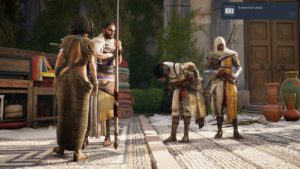 glitch sequences of AC Syndicate notwithstanding) and a husband, and hence perhaps a little removed from the average teenage gamer.
glitch sequences of AC Syndicate notwithstanding) and a husband, and hence perhaps a little removed from the average teenage gamer.
Aya on the other hand, appears not a little sinister. Ubisoft probably positioned her as a spiritual successor (predecessor really) to Evie, but the two are poles apart. Where Evie was a likeable, witty and intelligent character who had a friendly rivalry with her brother, Aya’s shades are darker. Initially she seems to be genuinely hurt by the loss of her son, but from the time she meets Cleopatra, she seems to be changing. She leaves Bayek more often and with less explanations, and begins to talk of greatness. You almost feel her moving into Templar territory, though thankfully, she never does so fully.
That said, her ambitions and goals move so far away from Bayek that it seems to be a tragic love story. Except unlike Ezio and Isabella, and unlike Arno and Elise, this tragedy is Aya’s own creation.  She moves away willingly, leaving behind her son’s memory and also her husband. While the game tries to portray this as a difficult decision, one may well question the very rationale of it. For me personally, her actions were unjustified and maybe she didn’t feel anything for Bayek anymore. (There’s another Reddit thread running on this at the time of writing).
She moves away willingly, leaving behind her son’s memory and also her husband. While the game tries to portray this as a difficult decision, one may well question the very rationale of it. For me personally, her actions were unjustified and maybe she didn’t feel anything for Bayek anymore. (There’s another Reddit thread running on this at the time of writing).
Beyond the primary characters, the game brings out two historical figures (three if you could Pompei) – Cleopatra and Caesar. Here is where the game truly shines. So much has been read about them that it is difficult to move into these sections without bias. But as a student of history, I wasn’t disappointed. Cleopatra is seen as a scheming woman who wishes for nothing but her own glory. She realizes that being a woman and a pharaoh of a declining empire, her options were limited. But she 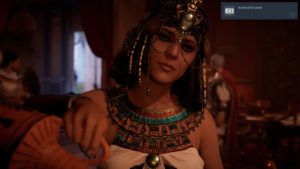 utilizes them masterfully. Caesar on the other hand believes (rightly) that the sky is the limit for his glory, and is becoming increasingly tyrannical. Yet he appreciates Bayek for his actions, and grudgingly gives Aya her due credit. Overall, the two, locked in a difficult dance of political death, come across as genuine to a degree which is hard to achieve given that they are, after all, figures of antiquity.
utilizes them masterfully. Caesar on the other hand believes (rightly) that the sky is the limit for his glory, and is becoming increasingly tyrannical. Yet he appreciates Bayek for his actions, and grudgingly gives Aya her due credit. Overall, the two, locked in a difficult dance of political death, come across as genuine to a degree which is hard to achieve given that they are, after all, figures of antiquity.
Coming to the villains, AC has made it a point to portray them in shades of grey rather than pitch black. Their moral dilemmas are brought out, making them more human than the average protagonist in a video game. In Origins, this is true for some only. You can genuinely feel for Khaliset, and one feels that given her work mostly deals with the desert around Giza, Bayek wasn’t fully  justified in killing her. Again, Taharqa is a family man with a self-flattering vision as the rebuilder of greatness. Pothinus comes across as something of a philosopher, though a misguided one.
justified in killing her. Again, Taharqa is a family man with a self-flattering vision as the rebuilder of greatness. Pothinus comes across as something of a philosopher, though a misguided one.
But that’s it. The others – Septimus, Medunamum, Galleinus and others, come across as cold blooded killers and nothing more. Their discussions after  assassination don’t provide much to redeem them either. Perhaps this is just as well, since the Templars have always had a combination of misguided do-gooders and selfish plotters, and ancient Egypt is shown to be no different.
assassination don’t provide much to redeem them either. Perhaps this is just as well, since the Templars have always had a combination of misguided do-gooders and selfish plotters, and ancient Egypt is shown to be no different.
The lesser characters, however, are truly interesting. Whether it is the Mouse in Cyrene, the protector of farms in the same region or (my favourite and uhh “crush”) Praxilla. Each is well defined in their small roles and you get hints of advances and chemistry. These are just hints, and nothing 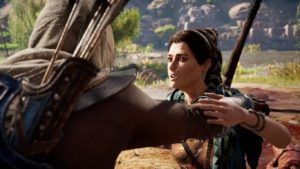 comes of them, but they turn characters who would otherwise just accompany you on a quest or two into fully living creatures who wish to form bonds. These small side quests, and their often heart-warming NPCs, make the grinding worthwhile, even when the actual mission involves nothing more than raiding a bandit camp or rescuing someone or the other.
comes of them, but they turn characters who would otherwise just accompany you on a quest or two into fully living creatures who wish to form bonds. These small side quests, and their often heart-warming NPCs, make the grinding worthwhile, even when the actual mission involves nothing more than raiding a bandit camp or rescuing someone or the other.
To sum up then, the game treats its characters seriously. None are insipid, managing to bringyou’re your emotions- positive or negative – in every case. The care taken to make historical figures realistic, and the NPCs likeable, tells us how much effort Ubisoft has put into making this game a masterpiece.
Rating – 5/5
Conclusion – AC Origins is, in every way, a worthy successor to Syndicate. It demands your time, and wont’ let you take short cuts. Levels are brutally strict and the storyline demands you stick to a certain course. However, even when it turns itself into an RPG, Origins is a good RPG in a world that has been painstakingly and lovingly created. The visuals are stunning and accurate, the characters have a certain joie de vivre and the plot doesn’t disappoint. If you have the time, and are willing to truly explore this fascinating world, AC Origins won’t disappoint you.
Overall Rating – 5/5


